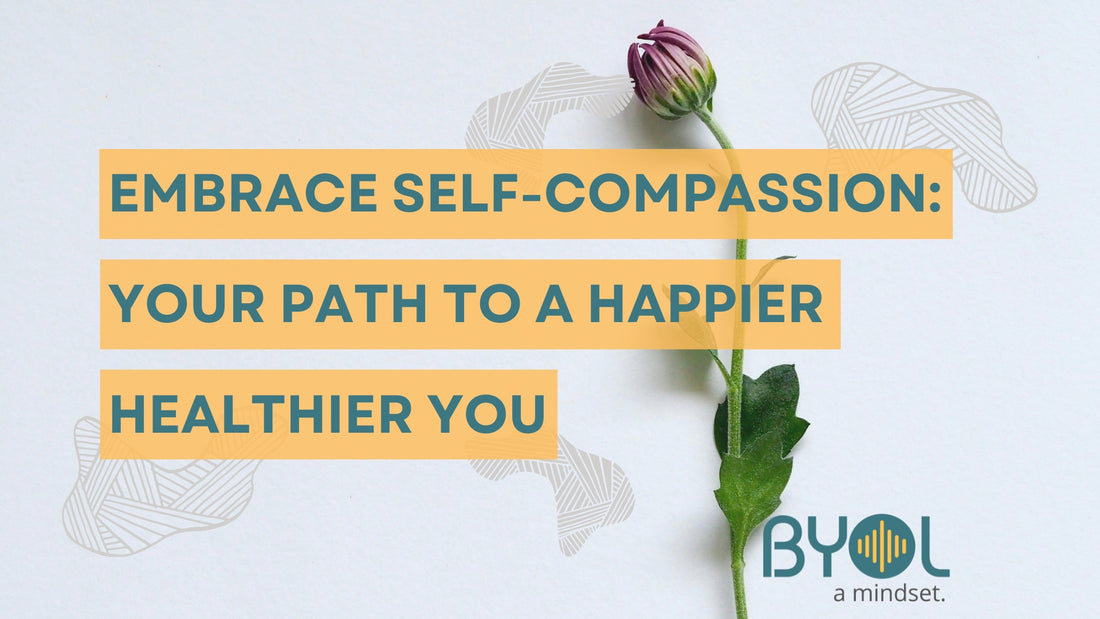
Self-Compassion: The Key to a Happier, Healthier Life
Maribell SmithIn today's fast-paced world, we're often our harshest critics. We're constantly bombarded with messages to improve, succeed, and push ourselves to the limit. But what if the secret to a happier, healthier life isn't found in striving for perfection, but in treating ourselves with kindness? Self-compassion, the practice of being gentle and understanding with oneself, has profound effects on our mental and physical well-being. In this article, we'll explore the importance of self-compassion, how to cultivate it, and the benefits it brings.
Please note that while I’m passionate about self-compassion and well-being, I’m not a licensed therapist or psychologist. The insights shared here are based on my personal experiences and research.
What is Self-Compassion?
Self-compassion involves treating yourself with the same kindness and understanding you would offer a good friend. It means recognizing that making mistakes and facing difficulties are part of the human experience. Instead of harsh self-criticism, self-compassion encourages a supportive and nurturing inner dialogue. This practice can be broken down into three main components:
- Self-Kindness vs. Self-Judgment: Being warm and understanding towards ourselves when we suffer, fail, or feel inadequate, rather than ignoring our pain or self-flagellating with harsh criticism.
- Common Humanity vs. Isolation: Recognizing that suffering and personal inadequacy are part of the shared human experience – something we all go through rather than something that happens to "me" alone.
- Mindfulness vs. Over-Identification: Holding our painful thoughts and feelings in balanced awareness rather than letting them take over and define us.
Why is Self-Compassion Important?
Emotional Resilience
Self-compassion helps build emotional resilience. When we are kind to ourselves, we can bounce back from setbacks more quickly. By accepting our imperfections, we learn to navigate life's challenges with greater ease and stability. This resilience isn't about avoiding pain but about meeting it with kindness and patience.
Mental Health
Research shows that self-compassion is strongly linked to lower levels of anxiety and depression. When we treat ourselves with compassion, we create a mental environment that is supportive rather than critical. This nurturing mindset reduces stress and promotes mental well-being.
Physical Health
Practicing self-compassion can lead to healthier behaviors. When we value our well-being, we're more likely to engage in activities that promote our health, such as regular exercise, balanced eating, and adequate sleep. Self-compassion reduces the stress that often leads to harmful behaviors and promotes a balanced approach to self-care.
How to Cultivate Self-Compassion
Cultivating self-compassion requires intentional practice and mindfulness. Here are some strategies to get started:
Mindfulness
Mindfulness involves paying attention to your inner dialogue and recognizing when you are being self-critical. By observing your thoughts without judgment, you can begin to understand your inner critic and respond with kindness. Mindfulness practices such as meditation can help you develop this skill.
Self-Kindness
Replace self-criticism with self-kindness. When you make a mistake or encounter a challenge, ask yourself, "What would I say to a friend in this situation?" Then, direct those kind and supportive words towards yourself. This shift in perspective can significantly impact your mental and emotional well-being.
Common Humanity
Remind yourself that everyone makes mistakes and faces challenges. This awareness helps you feel connected to others rather than isolated in your struggles. Understanding that suffering is a shared human experience can reduce feelings of loneliness and increase your sense of belonging.
Self-Compassion Exercises
Engage in exercises designed to cultivate self-compassion. Journaling can be particularly effective; write about your experiences with kindness and understanding. You might also try loving-kindness meditation, which focuses on sending goodwill and compassion to yourself and others. Positive affirmations are another powerful tool; repeat phrases like "I am worthy of love and compassion" to reinforce a compassionate mindset.
The Benefits of Self-Compassion
Improved Mental Health
Self-compassion reduces stress and anxiety, leading to a more balanced emotional state. When we treat ourselves with kindness, we create a mental space that supports our well-being. This supportive environment can decrease the symptoms of anxiety and depression, leading to a healthier mental state.
Enhanced Relationships
When we are kind to ourselves, we are more likely to be kind to others. Self-compassion fosters empathy and understanding, which can improve our relationships. By practicing self-compassion, we can become more patient and understanding with those around us, leading to stronger, more fulfilling connections.
Greater Life Satisfaction
Self-compassion increases overall life satisfaction. By fostering a positive self-image and reducing negative self-talk, we can appreciate our lives more fully. This appreciation extends to our achievements and experiences, leading to a greater sense of fulfillment and happiness.
Increased Motivation
Contrary to popular belief, self-compassion doesn't lead to complacency. Instead, it fosters a healthy motivation to improve and grow, based on self-respect rather than fear of failure. When we are kind to ourselves, we are more likely to set realistic goals and pursue them with determination and enthusiasm.
External Resources on Self-Compassion
For further insights into self-compassion and its benefits, consider exploring these authoritative sources:
- "The Power of Self-Compassion," Harvard Health Publishing. Link.
- "The Benefits of Self-Compassion," National Center for Biotechnology Information (NCBI). Link.
- "Mindfulness and Self-Compassion Practices," Greater Good Science Center. Link.
Conclusion
Cultivating self-compassion is a powerful way to enhance your well-being. By being kind to yourself, you can build emotional resilience, improve your mental and physical health, and lead a more fulfilling life. Start today by practicing mindfulness, self-kindness, and embracing your common humanity. Remember, treating yourself with compassion is not just a gift to yourself but also to those around you.










